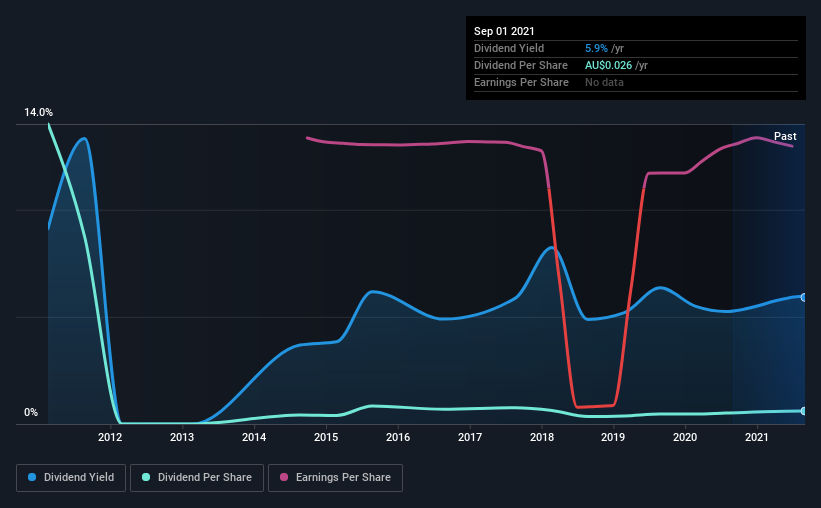Just Two Days Till Pental Limited (ASX:PTL) Will Be Trading Ex-Dividend
Pental Limited (ASX:PTL) stock is about to trade ex-dividend in two days. The ex-dividend date is one business day before a company's record date, which is the date on which the company determines which shareholders are entitled to receive a dividend. The ex-dividend date is of consequence because whenever a stock is bought or sold, the trade takes at least two business day to settle. In other words, investors can purchase Pental's shares before the 3rd of September in order to be eligible for the dividend, which will be paid on the 24th of September.
The company's upcoming dividend is AU$0.016 a share, following on from the last 12 months, when the company distributed a total of AU$0.026 per share to shareholders. Based on the last year's worth of payments, Pental has a trailing yield of 5.9% on the current stock price of A$0.44. If you buy this business for its dividend, you should have an idea of whether Pental's dividend is reliable and sustainable. So we need to investigate whether Pental can afford its dividend, and if the dividend could grow.
See our latest analysis for Pental
Dividends are usually paid out of company profits, so if a company pays out more than it earned then its dividend is usually at greater risk of being cut. Pental is paying out an acceptable 66% of its profit, a common payout level among most companies. Yet cash flow is typically more important than profit for assessing dividend sustainability, so we should always check if the company generated enough cash to afford its dividend. Thankfully its dividend payments took up just 31% of the free cash flow it generated, which is a comfortable payout ratio.
It's encouraging to see that the dividend is covered by both profit and cash flow. This generally suggests the dividend is sustainable, as long as earnings don't drop precipitously.
Click here to see how much of its profit Pental paid out over the last 12 months.
Have Earnings And Dividends Been Growing?
Stocks with flat earnings can still be attractive dividend payers, but it is important to be more conservative with your approach and demand a greater margin for safety when it comes to dividend sustainability. Investors love dividends, so if earnings fall and the dividend is reduced, expect a stock to be sold off heavily at the same time. It's not encouraging to see that Pental's earnings are effectively flat over the past five years. We'd take that over an earnings decline any day, but in the long run, the best dividend stocks all grow their earnings per share.
Another key way to measure a company's dividend prospects is by measuring its historical rate of dividend growth. Pental has seen its dividend decline 27% per annum on average over the past 10 years, which is not great to see.
To Sum It Up
From a dividend perspective, should investors buy or avoid Pental? We're not enthused by the flat earnings per share, although at least the company's payout ratio is within reasonable bounds. Additionally, it paid out a lower percentage of its free cash flow, so at least it generated more cash than it spent on dividends. All things considered, we are not particularly enthused about Pental from a dividend perspective.
If you want to look further into Pental, it's worth knowing the risks this business faces. Case in point: We've spotted 3 warning signs for Pental you should be aware of.
A common investment mistake is buying the first interesting stock you see. Here you can find a list of promising dividend stocks with a greater than 2% yield and an upcoming dividend.
This article by Simply Wall St is general in nature. We provide commentary based on historical data and analyst forecasts only using an unbiased methodology and our articles are not intended to be financial advice. It does not constitute a recommendation to buy or sell any stock, and does not take account of your objectives, or your financial situation. We aim to bring you long-term focused analysis driven by fundamental data. Note that our analysis may not factor in the latest price-sensitive company announcements or qualitative material. Simply Wall St has no position in any stocks mentioned.
Have feedback on this article? Concerned about the content? Get in touch with us directly. Alternatively, email editorial-team (at) simplywallst.com.

